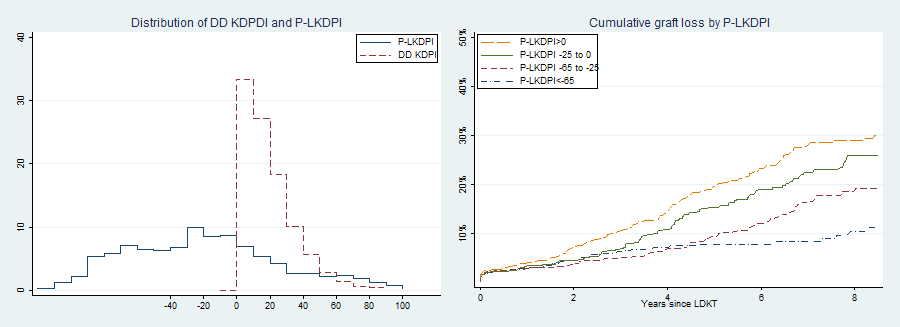P-LKDPI: A Donor Risk Index for Pediatric Recipients of Living Donor Kidney Transplantation.
JHU, Baltimore
Meeting: 2017 American Transplant Congress
Abstract number: 363
Keywords: Kidney
Session Information
Session Name: Concurrent Session: Kidney: Pediatric Adherence and Allocation
Session Type: Concurrent Session
Date: Monday, May 1, 2017
Session Time: 4:30pm-6:00pm
 Presentation Time: 5:18pm-5:30pm
Presentation Time: 5:18pm-5:30pm
Location: E353B
The Living Kidney Donor Profile Index (LKDPI) is used to assess risk of deceased donor kidneys for adult recipients based on donor characteristics. No comparable index exists for pediatric recipients. We present a new index of live donor risk, the P-LKDPI, on the same scale as the KDPI.
METHODS: We analyzed SRTR data on 7.069 pediatric deceased-donor kidney transplant (DDKT) and live-donor kidney transplant (LDKT) recipients 2004-2013. We modeled risk of all-cause graft loss as a function of KDPI (DDKT recipients) and LD characteristics (LDKT recipients) in a single Cox regression model, adjusting for recipient characteristics. The vector of coefficients for LD characteristics, multiplied by a vector of characteristics for a specific donor and divided by the coefficient for KDPI, yields a donor-specific risk score ("P-LKDPI") on the same scale as the deceased donor KDPI.
RESULTS: The regression model appears in Table 1; the algorithm for calculating LKDPI appears in Table 2. Median (IQR) P-LKDPI score for LD kidneys was -21 (-55 to 9), compared to KDPI of 15 (7 to 27) for DD kidneys. 68.8% of LD kidneys had LKDPI<0, indicating less predicted risk than all DD kidneys (Figure, left panel). LDKT recipients with higher P-LKDPI scores had poorer graft survival (Figure, right panel). The C statistic of the P-LKDPI was 0.60, compared to 0.53 for the deceased donor KDPI.
CONCLUSIONS: LD kidneys with higher LKDPI have poorer graft survival. The P-LKDPI may aid in decisionmaking for transplant candidates with a potential live donor, particularly for patients with multiple live donor candidates.
| Donor characteristic | aHR |
| DD: KDPI (per 10 units) | 1.02 1.06 1.10 |
| LD: baseline | 0.15 0.38 0.95 |
| LD: Age per 10y (past age 50) if recipient age<12 | 1.15 2.98 7.74 |
| LD: Systolic blood pressure (per 10 units) | 1.02 1.10 1.19 |
| LD: Donor/recipient weight ratio (max 4) | 0.79 0.87 0.97 |
| LD: 2 HLA-B mismatches | 1.17 1.50 1.92 |
| Calculation of P-LKDPI |
| -179.22 |
| +20.05 * (donor age-50)if donor age>50 and recipient age<12 |
| +1.76 * systolic blood pressure |
| -24.76 * min(donor/recipient weight ratio, 4) |
| +74.51 if 2 HLA-B mismatches |
CITATION INFORMATION: Massie A, Desai N, Neu A, Segev D. P-LKDPI: A Donor Risk Index for Pediatric Recipients of Living Donor Kidney Transplantation. Am J Transplant. 2017;17 (suppl 3).
To cite this abstract in AMA style:
Massie A, Desai N, Neu A, Segev D. P-LKDPI: A Donor Risk Index for Pediatric Recipients of Living Donor Kidney Transplantation. [abstract]. Am J Transplant. 2017; 17 (suppl 3). https://atcmeetingabstracts.com/abstract/p-lkdpi-a-donor-risk-index-for-pediatric-recipients-of-living-donor-kidney-transplantation/. Accessed July 12, 2025.« Back to 2017 American Transplant Congress

